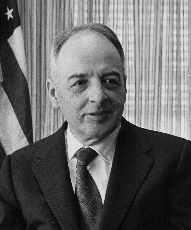Arthur Sherwood Flemming
Arthur Sherwood Flemming ( born June 12, 1905 in Kingston, New York, † September 7, 1996 in Alexandria, Virginia ) was an American politician, who was the Cabinet of President Dwight D. Eisenhower as health, education and welfare minister. He also served as president of several universities in the United States.
Rise in government services
Arthur Flemming made 1927 his bachelor's degree at Ohio Wesleyan University; the following year he obtained a Master in Political Science at the American University in Washington. Subsequently, he worked from 1930 to 1934 as a reporter for the Daily United States; during this time he made his law degree at George Washington University. Between 1934 and 1938 he served as director of the School of Public Affairs at American University.
His career in public service began in 1939 when President Franklin D. Roosevelt appointed him as the representative of the Republicans in the Civil Service Commission, where he remained until 1948. He was also a member of the Hoover Commission, which dealt with the organizational structure of the federal government. In June 1948, he accepted an offer to become president of Ohio Wesleyan University; this office he held as the first alumnus of the university. 1951 he was on leave in to be deputy director of the Office of Defense Mobilization. Two years later he moved up to director of government authority.
Minister and President of the University
In 1957, Fleming returned to his alma mater, but the following year, President Eisenhower appointed him as Secretary of Health, Education and Welfare in his cabinet. There remained Flemming from 1 August 1958 to the end of Eisenhower's term of office on January 19, 1961 As a minister, he built the social security system further.; Moreover, he adjusted his authority in 1959 in the focus of public attention when he banned the sale of cranberries just before Thanksgiving. The fruits, as a base for the cranberry sauce fundamental part of the Thanksgiving menu, had been sprayed with toxic pesticides. A focus of his work was also on the commitment for the elderly and the desegregation of the education system.
After his departure from the government Flemming became president of the University of Oregon. During his tenure, the number of students grew from 8,000 to 14,000; also significantly more federal funds have been invested in Eugene. Under Flemming was the School of Community Services and Public Affairs established at the University, in addition, an observatory, and various laboratories were constructed on the campus. He advocated that Gus Hall, leader of the Communist Party, was allowed to speak on campus. From 1969 to 1971 he was still president of Macalester College.
Further CV
1966 Flemming was elected for four years as President of the National Council of Churches USA ( National Council of Churches ). After him, U.S. President Richard Nixon appointed 1971 Senior Officer of Government ( Commissioner on Aging ). This he remained until 1978; also he led from 1972 to 1982 chaired the state Civil Rights Commission.
After he was awarded in 1957 by President Eisenhower with the Presidential Medal of Freedom, Flemming received this award a second time in 1994 by Bill Clinton. Two years later he died in a retirement home in Virginia to acute renal failure. According to the former Minister of the Arthur S. Flemming Award is named as a tribute to the outstanding achievements of Federal employees. Among other things, Neil Armstrong, Robert Gates and Elizabeth Dole this honor has been bestowed.










